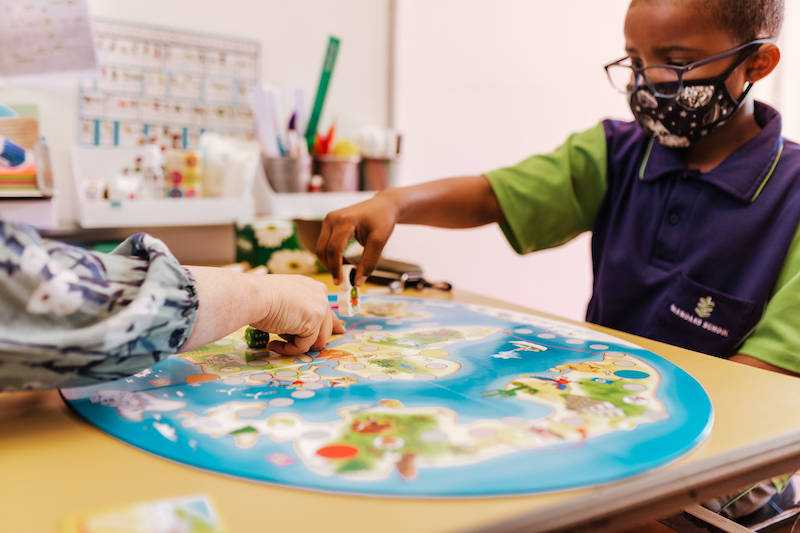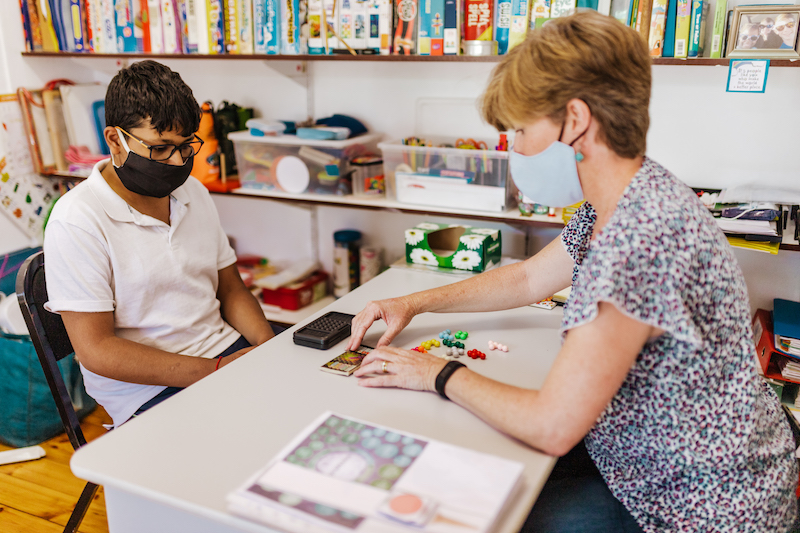A young poet, Mattie Stepanek, once said: “Unity is strength… when there is teamwork and collaboration, wonderful things can be achieved.” The multidisciplinary team (MDT) working at Glenoaks remedial and special needs school, epitomises collaboration through its remarkable interdisciplinary approaches that aim to enhance the potential and learning of every child in our school. It is only through collaboration and the sharing of knowledge, that one can optimise learning.
An integral part of the MDT team at Glenoaks School is the passionate therapy team. The primary purpose of any therapy is to increase a child’s participation, independence and engagement in activities that are relevant to their life. Glenoaks’ therapists are onsite for the full school day which allows them the opportunity to provide therapeutic intervention based on the learner’s individual needs. Intervention occurs individually, in pairs, in groups or even within the classroom itself to ensure carryover of skills being learnt. Glenoaks’ therapists provide not only assessment and intervention services to the learners but also support and guidance to the teachers and parents. They are involved in every aspect of learning and take part in case discussions, placement decisions and termly parent feedbacks – which provides the opportunity for parents to gain information about their child’s areas of strengths and difficulties holistically.

THE DIFFERENT THERAPEUTIC DISCIPLINES OFFERED AT GLENOAKS INCLUDE:
Psychology
Our Psychologists primarily focus on the emotional well-being of our learners. An eclectic therapy approach is utilised, which is flexible and multifaceted. Many children experience problems that affect how they feel, think or act and therapy helps them with this. The aim of therapy is thus to assist our learners to overcome behavioral, emotional and social problems that interfere with success at school and at home. Therapy helps them to cope better, communicate better and do better. Through talking, playing, drawing, practicing new skills and solving problems, learners display:
- Improved communication and personal skills
- Ability to manage stress more effectively
- Better expression and understanding of emotions
- Improved self-esteem and confidence
- Improved problem-solving abilities
Our Psychologists also provide parental guidance, to assist parents in supporting their children to reach their full potential and offer parent counselling, by providing a space for parents to discuss and explore their own emotions with regards to accepting and understanding their child’s areas of weakness and celebrating their strengths.
Occupational Therapy

Our Occupational Therapists use an interdisciplinary and multidisciplinary approach to assess and treat learners with challenges in the areas of gross motor, fine motor, visual perceptual development, as well as sensory processing.

The aim of Occupational Therapy in the school environment is to enhance a learner’s ability to fully access the learning environment and actively engage in the learning process so that they may participate in all aspects of school life (academic and non-academic).
Our therapists use a variety of games, sensory activities, functional activities and academic-related tasks to meet these outcomes. In addition to this, the learning environment is taken into consideration, with classroom and activity accommodations recommended and implemented when necessary.

Speech, Language Therapy and Audiology
Our Speech Pathologists and Audiologists primarily focus on the assessment and treatment of social and cognitive communication difficulties. One of the most crucial aspects of learning is the development of communication skills. In order to communicate however, children require language. Reading, writing, listening, and speaking are all forms of language and proficiency in the understanding and use of language will enable a child to be able to cope better at school. Speech and Language Therapy is therefore provided to students who present with delays or deficits in communication that are impacting on their social and academic performance. Our therapists focus on developing the learner’s speech, voice, fluency, auditory processing and receptive (understanding what is said) and expressive (expressing one’s thoughts logically and coherently) language skills in order to support their interpersonal communication and curricular goals. Through collaboration with the MDT, our Speech Pathologists aim to improve and facilitate success in oral and written communication, executive functioning, literacy, critical thinking and reasoning.
Remedial Therapy
Our Remedial therapists focus on assisting learners overcome or cope with their academic difficulties. Remedial therapy, also referred to as learning support, acknowledges the potential of learners to grow at their own pace towards their maximum level of independence in their academic learning. Our therapists focus on developing and improving reading, reading comprehension, spelling, writing, and mathematical skills. Individualised strategies and practising learning styles of choice are used to support learners in reaching a level of achievement according to their unique abilities. The remedial therapy department works in collaboration with people from the multidisciplinary therapy team, family and community to which the learner belongs, to accommodate and meet specific support needs.

Robert John Meehan said: “Every child has a different learning style and pace. Each child is unique, not only capable of learning but also capable of succeeding.” Successful children become successful adults who have a good self-esteem and self-worth. They enjoy learning new things and are not afraid to explore new avenues. Glenoaks’ MDT team nurtures our learners to achieve their potential and achieve success – whether it be academic or within the more practical realm.
Authors:
Meera Rijhumal – Speech Language Therapist & Audiologist – Glenoaks School
Karen Jacobs – Speech Language Therapist and Audiologist – Glenoaks School
- When to Push My Child and When to Step Back - March 18, 2024
- Benefits of Including STEM into the Classroom - March 5, 2024
- The Role of Parents in the Education of Special Needs Children and Fostering a Collaborative Approach - February 21, 2024





